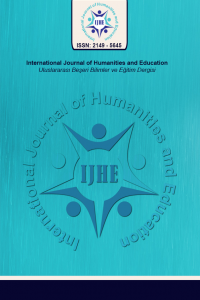Tarih’e Tahkiyeli Yaklaşım: Kurgusal Bağlamda “Çanakkale Savaşı”nı Yorumlayabilmek
Çanakkale Cephesi, Osmanlı İmparatorluğu’nun, Birinci Dünya Savaşı içinde zaferle ayrıldığı tek cephedir. Bu cephede kazanılan zaferle Türkler, yıllardır yenilgiyle sonuçlanan savaşlar yüzünden kaybettikleri özgüvenlerini tekrar elde etmişler ve bir millet olmanın bilincine vararak, yeniden tarih sahnesine çıkmışlardır. Bu bakımdan buradaki muharebelerin ve bu muharebeler sonucunda elde edilen zaferin, Türk tarihi açısından çok büyük bir önemi vardır. Bu tarihi zafer, edebi türler açısından da sık sık ele alınmıştır. Harp edebiyatını oluşturan bu metinler, aynı sıkıntıların tekrar yaşanmaması adına önemli ikaz levhalarıdır. Milletlerin oluşumunu derinden etkileyen bu ortak acılar, o milletin toplumsal hafızasının canlı kalması için ve “şiir, hikâye, deneme…” gibi türler vasıtasıyla, devrin tanığı kültür adamlarının kaleminden gelecek nesillere aktarılır. Bu çalışmada; 1911-1919 yılları arasında yayınlanan Donanma mecmuası, Çanakkale Savaşlarına ait edebi metinler açısından incelenmiştir. Dönemin canlı tanığı bir dergi; tarihi gerçekliği yansıtması yanında, savaşın acımasız ortamını yaşayanların duygu ve düşüncelerini aktarması bakımından da, eserlerden örneklemeler yapma yöntemiyle ayrıntılı bir şekilde değerlendirilmiştir. Bu yaklaşım tarzıyla; insanî tepkileri dile getiren edebi metinler, edebiyat-tarih ilişkisi bağlamında, tarih sahnesindeki milletin ilgili döneminin daha sağlam şekilde ortaya konulması bakımından ele alınmıştır.
Anahtar Kelimeler:
Edebiyat-tarih ilişkisi, Çanakkale savaşı, donanma dergisi.
Narrative Approach toHistory: To Interpret the Fictional Context of the Gallipoli War
Çanakkale Front is the only front which Ottoman Empire won victory in the First World War. With the victory which has won in this front, Turks obtained again their self-confidences which they had lost because of the wars resulted with defeat and appeared in history again by comprehending to become a nation. Thus, the battles there and the victory obtained at the end of these battles are very important in view of Turkish history. This historic victory is discussed frequently in terms of literary genres. Nations, deeply affecting the formation of the joint pain, it is the survival of the nation's social memory, to witness the transfer of culture passed on from generation to pen his men, by species such as "poem, story, essay...".War of the texts that make up literature, an important indicator boards on behalf of the same problems happen again. In this study, the Donanma Magazine, published between1911-1919, has been investigated in terms of literary texts of the Gallipoli War. Besides historical reflection of reality, a magazine with a living witness of the period has been considered in detail, feelings and thoughts of the inhabitants of the brutal environment of the war in terms of transfer and the sampling method to make the works. By means of this kind of approach; in the context of the relationship between literature and history, literary texts voicing humanitarian response has been discussed in terms of a more robust way to reveal of the nation's historical period.
- Başlangıç: 2015
- Yayıncı: Halil TURGUT
